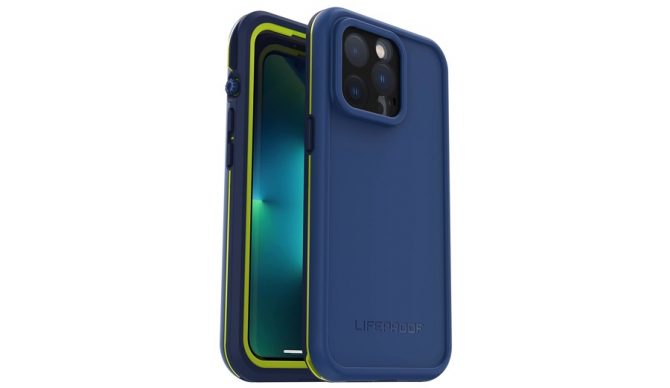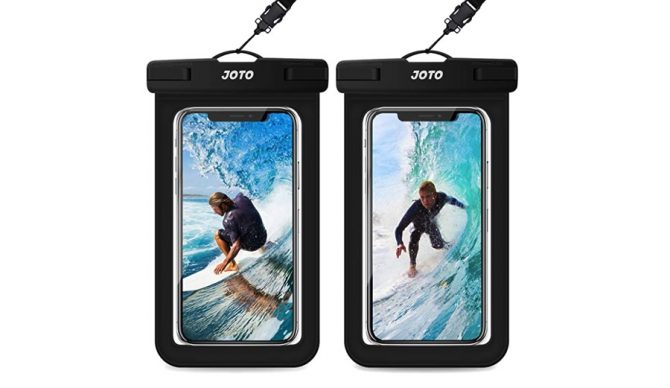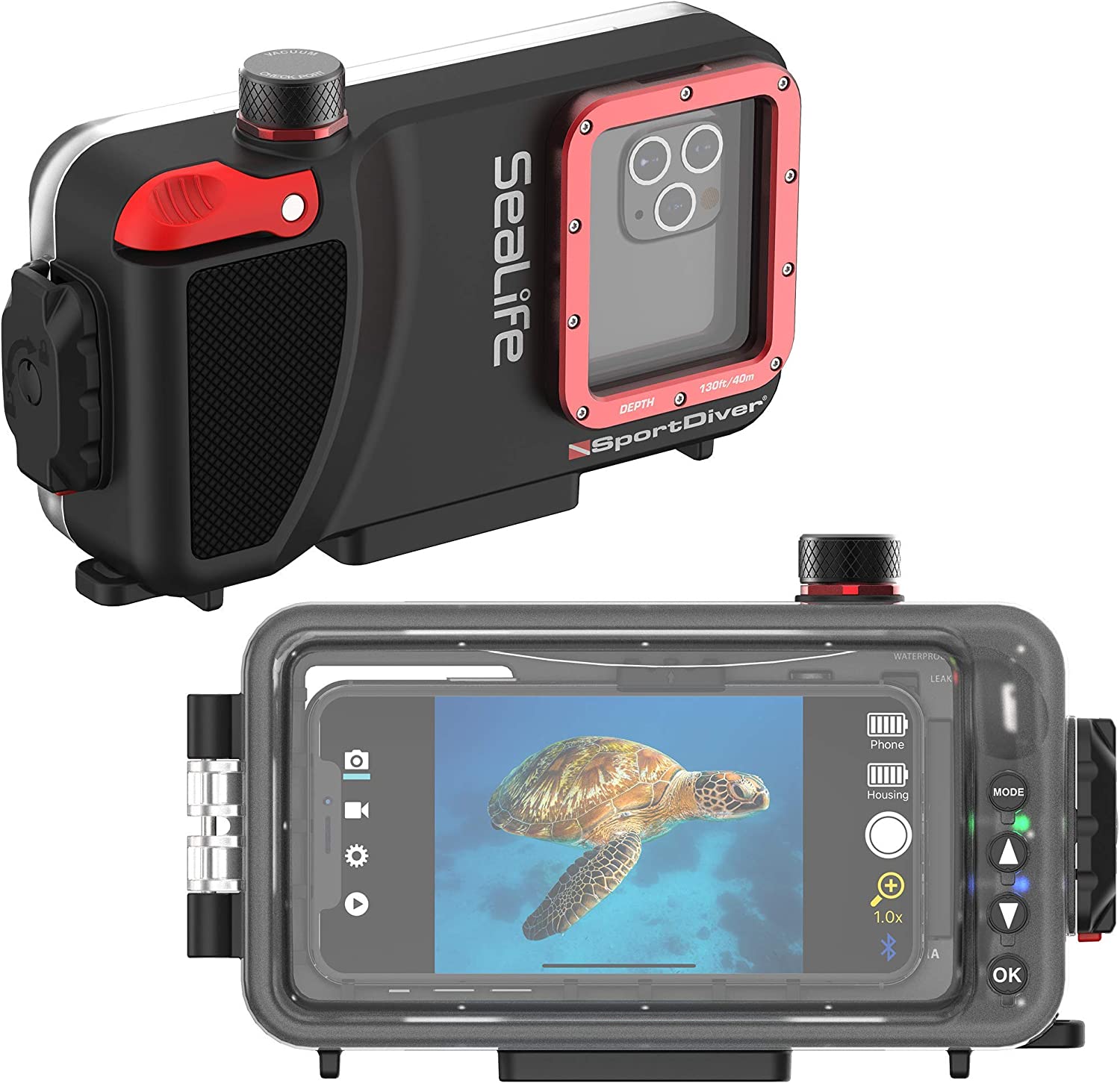
Waterproof phone cases are an affordable way to take high-quality surf photos. Photo: Rebecca Parsons//The Inertia
If you spend a lot of time on, in, or near the water, a waterproof phone case is a great investment. Whether you’re prone to dropping your phone, want to take it into the water with you for sports like paddle boarding, or want to get into water photography, there’s a waterproof case out there that will fit your needs.
Although some phones these days are waterproof, they often aren’t reliable for long periods of submersion. Luckily, there are some solid phone cases specifically made for in-water use that will keep your phone safe and allow you to capture all the action, track your activities, or keep in touch with friends and family while on the water. We tested a wide variety of waterproof phone cases, some intended for daily or casual use, and others intended for in-water photography, both at the surface and down to the limits of scuba depth at 130 feet deep.
Navigate To: Comparison Table | How We Tested | Buyer’s Guide | Best Cameras For Surf Photography
Editor’s Note: We updated this guide in November 2024 with additional testing notes, improved navigation, and refreshed links.
The Best Waterproof Phone Cases of 2025
Best Waterproof Phone Case for Everyday Use: LifeProof FRĒ
Best Budget Waterproof Phone Case: Joto Waterproof Phone Pouch
Best Waterproof Phone Case for Surf Photography: AxisGo
Easiest to Use Waterproof Phone Case: ProShot Dive
Best Waterproof Phone Case For Diving: SeaLife SportDiver
Best Budget Phone Case for Diving: Willbox Diving Case
Best Waterproof Phone Case for Everyday Use
LifeProof FRĒ ($70)
Pros: Slim design, 360-degree protection
Cons: Tricky to take photos while underwater, can only be underwater for limited time
Depth Rating: 6.5 feet
LifeProof’s FRĒ case is designed for everyday use and is durable enough to withstand an adventurous lifestyle. The FRĒ features 360-degree protection with a built-in screen cover that seals it from dirt, dust, snow, and ice. The phone is submersible for two meters for an hour, so you can definitely take it in the water, you just have to watch your time and depth.
Although all of the phone features work while inside the case, it takes a little extra effort to text and take photos with the touch screen and it doesn’t work while underwater. We like this case because it keeps our phone safe at all times, but it’s better suited for photos from the boat when you need something to protect your phone from the occasional splash. If you’re looking for a case for in-water photography, it’s possible with the LifeProof FRĒ, but isn’t the most reliable option.
If you want a phone case that is easy to navigate in the lineup, the ProShot Dive is hands down the easiest high-tech case on our list. Or, if you just want to throw a quick case on to protect your phone from splashes, the Waterproof Phone Pouch is a cheap and easy option, but it’s difficult to impossible to operate your phone when it’s in the pouch.
CHECK iPhone 15 PRICE ON Otter Box CHECK iPhone 14 PRICE ON AMAZON CHECK iPhone 13 PRICE ON AMAZONBest Budget Waterproof Phone Case
Joto Waterproof Phone Pouch ($10)
Pros: Cheap, simple
Cons: Compromised clarity for photos, reliability is questionable
Depth Rating: 100 feet
Joto’s Waterproof Phone Pouch is one of the simplest designs out there, but surprisingly effective. The design is sort of like a high-tech Ziplock bag and it’s rated waterproof to 100 feet, though we probably wouldn’t take it that deep. You are able to use your touch screen through the pouch but if you’re looking to take photos underwater, you’ll need to use the volume button as the touch screen doesn’t work while underwater.
We have yet to have any issues with the case, but we’d personally use it as more of a water-resistant option to take photos from the boat or in the splash zone, rather than fully submerging it – it’s designed to be fully submerged, but at $10, we’re a little skeptical of how reliable it actually is. The photo clarity will also be somewhat affected. For the price, it’s a great option for ensuring your phone stays safe should you encounter rain or splashing while you’re using it, or if your phone is already waterproof and you just want some added security.
If you plan on taking shots of surfers or snorkeling or scuba diving with your phone, the AxisGo is an all around incredible waterproof phone case that is depth rated to 33 feet. Or, if you want something that will keep your phone protected at all times, the LifeProof’s FRĒ is a great everyday option.
CHECK PRICE ON AMAZONBest Waterproof Phone Case for Surf Photography
AxisGo ($200)
(Currently on sale for $40)
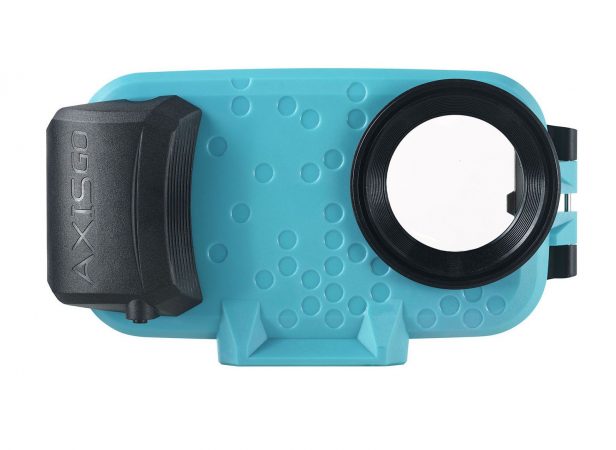
Pros: Touchscreen access, lots of accessories
Cons: Designed for iPhones specifically
Depth Rating: 33 feet
Designed specifically for iPhones, the AxisGo is all about keeping your phone protected while allowing for the perfect shot. To use, you simply place your phone in the case, snap the secure locking clip, and you’re ready to go. The phone case provides full touchscreen access, allowing you to use photo apps, take selfies, and instantly share your shots with contacts. The case is depth-rated to 33 feet, so in addition to surf photography, you can take it on shallow dives.
The AxisGo has compatible accessories available for purchase including a Bluetooth pistol grip which allows users to take photos with the click of a button and a dome port which helps create stunning over/underwater shots – we’re a big fan of both accessories. Overall, this case felt super reliable, was easy to use, and created awesome shots. In the year we’ve had the case, our tester has taken lots of photos near her home on Oahu and has also taken it on snorkeling trips in both Fiji and Palau and is continuously impressed with its performance.
The AxisGo case is currently on sale for just $40 in limited sizes, as Aquatech replaces this epic line of phone cases with their new JOBY SeaPal waterproof phone cases that are compatible with a wider range of devices, instead of just iPhones. We are working on getting our hands on this new case and will update this review once we do so, but in the meantime, you can check them out here.
If $200 is too steep for you, the ProShot Dive is $40 and is depth rated 100 feet deeper, but it doesn’t work as a touchscreen and the app can be a bit finicky.
CHECK PRICE ON underwater See the JOBY SeaPal ON AmazonEasiest to Use Waterproof Phone Case
ProShot Dive ($170)
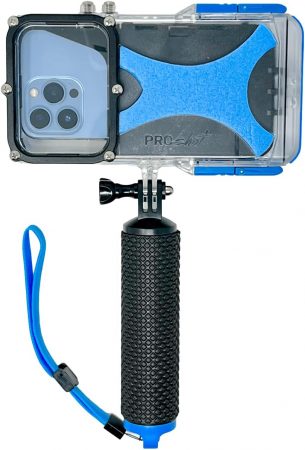
Pros: Easy to use, wrist strap
Cons: App can be finicky
Depth Rating: 130 feet
The ProShot Dive case has everything we want in a waterproof phone case with an easy-to-use design. To use the case, you simply slip in your phone, lock the case, and you’re good to go. The touch screen doesn’t work while underwater, but the case comes with a compatible app and once you download it, you can easily switch from photo to video while in the water.
The only challenge we had while taking photos was that the app kept switching to sleep mode and then would take a couple of seconds to get back in focus, which caused us to miss a few shots. Sometimes we simply used the case on its own without the app when we didn’t feel like messing with it. The case comes with a floating hand grip and a wrist strap, which makes it much easier to swim and take photos. Despite being one of the smaller and seemingly simpler cases, the ProShot case is waterproof to 130 feet, so you can easily take it on dives in addition to capturing images in the surf.
CHECK PRICE ON pro shot caseBest Waterproof Phone Case for Diving
SeaLife SportDiver ($300)
Pros: Waterproof to 130 feet, super heavy-duty
Cons: Pricey, trickier to use
Depth Rating: 130 feet
Although the price is a little steep, SeaLife’s SportDiver case is the most advanced case we’ve come across. The case fits most Android and iPhone models and is waterproof to 130 feet, so it’s perfect for scuba, free diving, and surf photography. The heavy-duty case is constructed from Polycarbonate, stainless steel, aluminum, and optical-grade glass, meaning your phone is ultra-safe. The free app uses Bluetooth and allows you to easily switch between photo and video while underwater and use settings like adjust zoom, exposure (EV), auto/manual focus, white balance, tint, lens selection, RAW and JPEG mode, live photo, and background mode. The advanced camera settings allow you to get creative with your photos and take the best shot possible – we really appreciated the zoom for capturing photos of my friends surfing.
Other thoughtful features include a removable underwater color-correction filter, holding spring and rubber grip tabs to ensure your phone stays securely in place, an anti-fog design, and a dual leak alarm should the waterproof seal be compromised. While this camera is amazing for scuba and takes incredible photos, it’s a little heavy for surf photography and doesn’t include a handle, so you need a firm grip on it at all times. Overall, we were impressed with the different features the case offered and by the quality of photos it allows for.
Another great phone case for divers and surf photography is the ProShot Dive — it’s easier to use than the SportDiver, costs just $160, and is also depth rated to 130 feet. However, the ProShot isn’t as heavy-duty as the SportDiver and doesn’t have all the setting options.
CHECK PRICE ON AMAZONBest Budget Waterproof Phone Case for Diving
Willbox Diving Case ($40)
Pros: Lanyard attachment, side grip with shutter button
Cons: Can only be used for shallow dives
Depth Rating: 50 feet
Another “universal option,” the Willbox Diving Case is made to be used with both iPhones and Samsung’s line of Galaxy smartphones. A lanyard attachment provides an added layer of security, and a tripod mount allows you to connect the case to a tripod or a compatible phone pole (for selfies), or a pistol grip. The case also boasts its own side grip with a shutter button, so it’s easy enough to use without added accessories.
Rated to 50 feet, the case is a solid option for shallower dives, though if you’re looking to go deeper, you may want to check out the SeaLife case, above. Or, if you want a case that you can use daily, the LifeProof’s FRĒ is only rated to 6.5 feet, but it’s a great daily case.
CHECK PRICE ON AMAZONBest of the Rest
AICase Self-Check Waterproof Phone Case ($16)
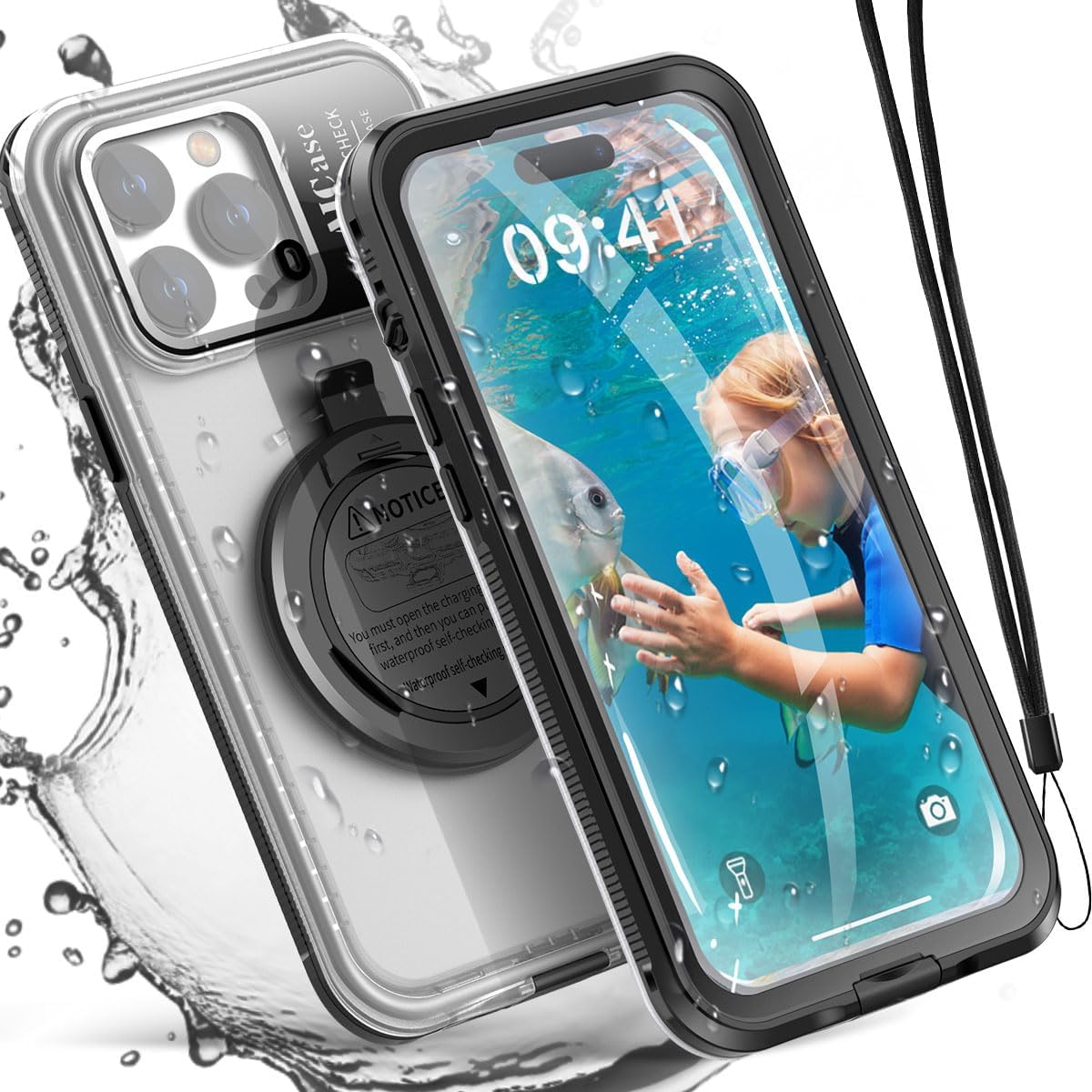
Pros: Affordable, self-checking waterproof technology
Cons: Touch screen doesn’t work great when wet, difficult to hear on phone calls
Depth Rating: 98 feet
If you’re looking for a daily phone case that fares well in water, the AICase Self-Checking Waterproof Phone Case is a great option. The phone case is easy to get your phone inside and the sleek design makes it a good option for daily use. The case has a self-checking waterproof check pump on the back that puffs up the front of the case when it is fully sealed and ready to submerge in water. Our tester really appreciated the visual to confirm that everything was, in fact, fully sealed.
Thanks to the design of the front panel, you are able to use your touch screen both in and out of the water, although we found that the touch screen didn’t work as well when wet. When the case is on and fully sealed, it can be a little difficult to hear when on a phone call and Siri has a difficult time registering voice commands. The AICase has a depth rating of 98 feet, which we thought was incredible for such an affordable case. We haven’t had the chance to take it that deep yet but are excited to use it for scuba diving.
CHECK PRICE ON AMAZONHiearcool Waterproof Phone Pouch ($10)
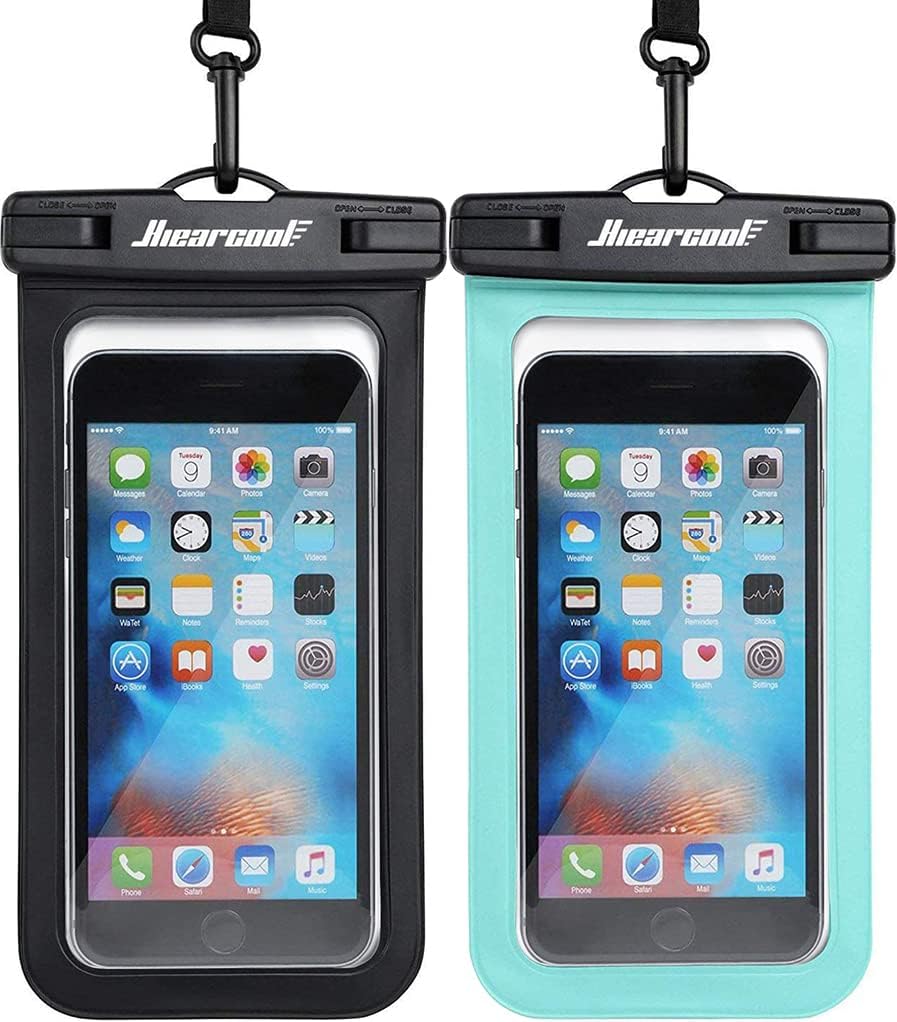
Pros: Affordable, easy to use
Cons: Touch screen doesn’t work when underwater
Depth Rating: N/A
The Hiearcool Waterproof Phone Pouch sports a simple design at an affordable price. In order to use the phone pouch, you simply slip your phone inside and snap the lock buttons on the top. The Hiearcool phone pouch works with most phones, so you can easily share it with friends and family. The design is similar to the Waterproof Phone Pouch but doesn’t provide a depth rating whereas the Waterproof Phone Pouch is depth rated to 100 feet.
We found that the touch screen worked okay when above water, but it didn’t work when submerged. In order to take photos underwater, we set our phone so the screen would stay on and took photos using the volume button. We found that this method worked well and the photos came out crisp and clear as long as the case was clean. The kit comes with two phone cases and a lanyard for each — at $8.50 we thought it was a steal. No depth rating was listed but due to the price, we’d say this case is best used for surface-level photography.
CHECK PRICE ON AMAZONShellBox Diving Case ($49)
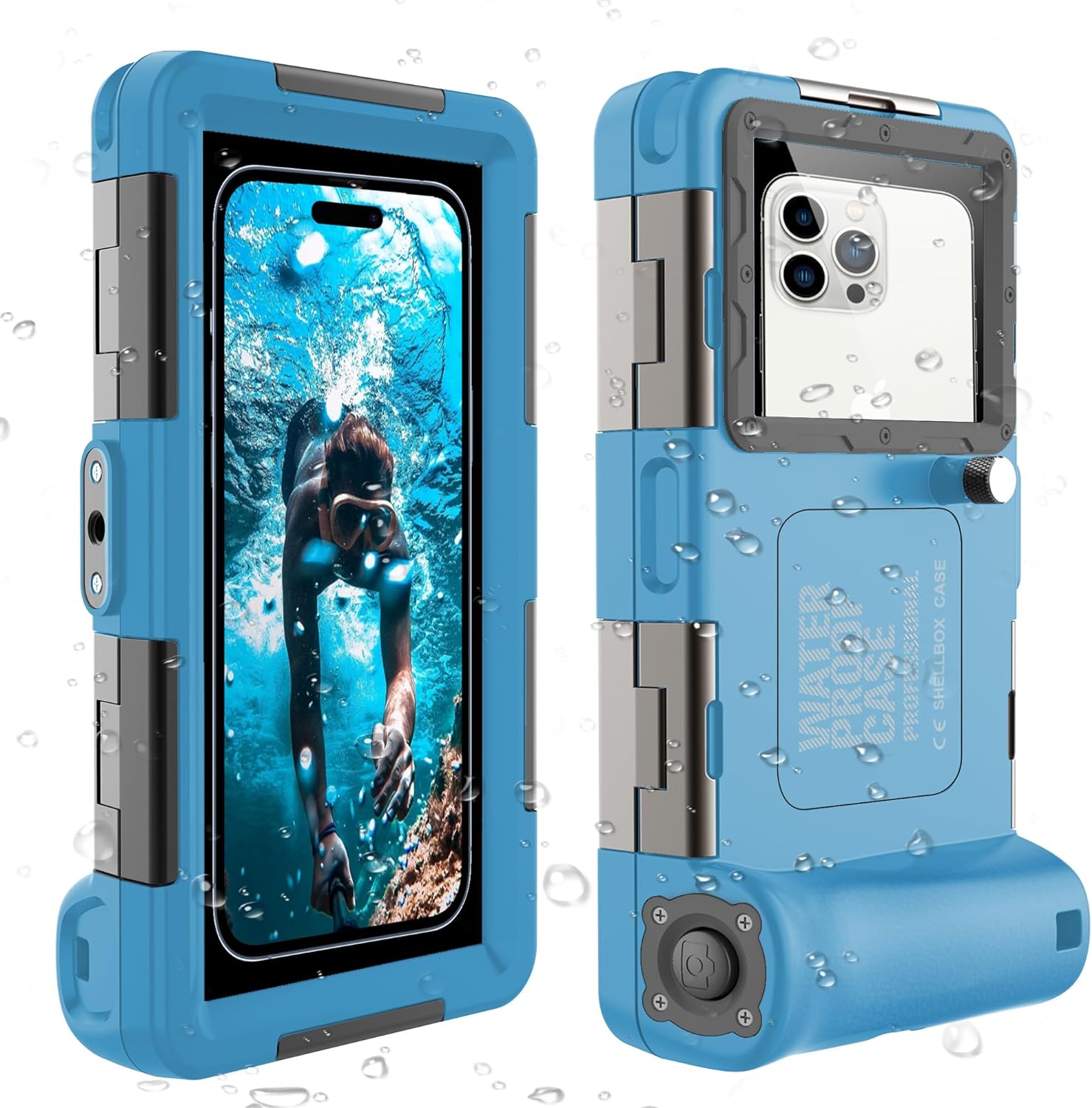
Pros: Wide screen opening, touch screen works underwater
Cons: Doesn’t work as well for smaller phones, 50 feet is a shallow depth rating for a diving specific case
Depth Rating: 50 feet
The ShellBox Case Diving Case is a heavy-duty waterproof phone case that is rated to 50 feet. Designed specifically for diving, the ShellBox case has air venting holes to help discharge air while you dive. This allows the backing to sit closer to the phone screen, enabling you to use the touch screen while you dive. The face identification worked well but we still preferred to lock our phone so that the screen stayed open while diving and use the shutter button to take photos like you would on a traditional camera.
The ShellBox phone case works with an assortment of phone sizes, but we found it worked better with larger phones. However, it has adjustment tabs inside so you can get it fitted to your specific phone. It took some finagling to get it fitted but once we did, everything felt secure. The widescreen opening ensured the camera lens would never be covered and we found it was convenient and easy to snap photos. Finally, the phone is secured with six locks so you can rest easy knowing that your phone is protected. At $49, we felt the ShellBox phone case was a great price for a high-quality case.
The ShellBox has a similar design to the Willbox Diving Case but is a tad pricier. If you prefer a more heavy-duty phone case with a deeper depth rating, the SeaLife SportDiver is a hefty case rated to 130 feet.
CHECK PRICE ON AMAZONWaterproof Phone Cases Comparison Table
| Waterproof Phone Case | Price | Intended Use | Depth Rating |
| LifeProof FRĒ | $70 | Everyday | 6.5 feet |
| Joto Waterproof Phone Pouch | $10 | Splash zone | 100 feet |
| AxisGo | $200 | Surf and shallow dives | 33 feet |
| ProShot Dive | $170 | Surf and shallow dives | 130 feet |
| SeaLife SportDiver | $300 | Surf, snorkeling, and scuba | 130 feet |
| Willbox Diving Case | $40 | Surf and shallow dives | 50 feet |
| AICase Self-Checking Waterproof Phone Case | $16 | Surf, snorkeling, and scuba | 98 feet |
| Hiearcool Waterproof Phone Pouch | $10 | Splash zone | N/A |
| ShellBox Case Diving Case | $49 | Surf, snorkeling, and shallow dives | 50 feet |

Taken with the AxisGo waterproof phone case. Photo: Rebecca Parsons//The Inertia
How We Tested Waterproof Phone Cases
Hailing from Hawaii and California, our lead tester Rebecca Parsons is an avid waterwoman who spends a lot of time in and around the ocean. As a surfer and standup paddler, she’s often in need of some extra waterproof protection for her cell phone whether that’s for casual activities around the water or in training and practicing for her sports.
As a free diver and scuba diver, Rebecca was able to put the hardier cases featured in this review to the ultimate test under the ocean to see how they held up at depth. For the less substantial cases, like the LifeProof FRĒ and Joto, she simply stored her phone in them for flat water paddles and tested their waterproofing. For the surf-oriented cases, Rebecca took to the lineup, getting shots of herself and others to test the cases’ photo clarity and other photography-oriented features.
Before hitting the ocean with the cases, Rebecca first put them on her phone at home, ran them under water, and then submerged them in a bucket to make sure they didn’t leak. After that, she hit the water to do some serious testing. Rebecca has an iPhone SE and was able to test a few of the cases using her phone but for cases that weren’t compatible with an older iPhone, she used her husband’s iPhone 14 Pro.
Best Waterproof Phone Cases Rating Table
| Waterproof Phone Case | Waterproof | Ease of Use | Depth Rating | Clarity | Overall |
| LifeProof FRĒ | 5 | 3 | 2 | 4 | 3.5 |
| Joto Waterproof Phone Pouch | 4 | 4 | 2 | 3 | 3.25 |
| AxisGo | 5 | 5 | 4 | 5 | 4.75 |
| ProShot Dive | 5 | 4 | 4 | 4 | 4.25 |
| SeaLife SportDiver | 5 | 3 | 5 | 5 | 4.5 |
| Willbox Diving Case | 5 | 4 | 4 | 5 | 4.5 |
| AICase Self-Checking Waterproof Phone Case | 4 | 4 | 4 | 4 | 4 |
| Hiearcool Waterproof Phone Pouch | 4 | 5 | 2 | 3 | 3.5 |
| ShellBox Case Diving Case | 5 | 4 | 4 | 4 | 4.25 |

Taken using the AxisGo with dome accessory. Photo: Rebecca Parsons//The Inertia
Waterproof Phone Cases Buyer’s Guide
Test Before You Go
It is good practice to test out your phone case at home before heading to the pool, beach, lake, or river. We recommend placing a piece of tissue paper or a paper towel inside the phone case and then fully sealing the pouch. After that, run water over the case and then fully submerge it in the sink or a bucket of water for a solid 10-15 minutes. Then, open up the case and see if your tissue paper is still dry. If it is, you should be good to go!

Some of the different types of phone cases we tested. Photo: Rebecca Parsons//The Inertia
What Makes A Good Waterproof Phone Case?
For starters, we need a phone case that is fully and reliably waterproof. Additionally, we want a case that is easy to use, works at depth, and takes great photos.
Waterproof
If the phone case isn’t waterproof, it’s not doing its job. Our phone is a staple in both our work and social life, so we really don’t want it to get water damage. We need a case we can rely on.
When a phone case is advertised as “waterproof,” take that with a grain of salt. If it only costs $10, like the Joto Waterproof Phone Pouch you probably don’t want to rely on it being fully submersible for long periods of time. Consider cases like that to be more splashproof than waterproof. But if you’re feeling bold, you do you – it might just work.
Warranties
It’s hard to know if a phone case is truly waterproof without testing it. We tried to help you out by testing these cases and risking our phones so you don’t have to. However, we recommend looking for a case with some kind of warranty so that in case it doesn’t actually work, you’ll be protected.

Taken using the ProShot in Oahu, Hawaii. Photo: Rebecca Parsons//The Inertia
Phone Compatibility
If your phone case doesn’t fit your phone, then it won’t do you any good. All of the phone cases in this review listed what types of phones they work with. Our tester has an older iPhone SE and found that many of the cases wouldn’t work for her phone, so she had to test them using her husband’s iPhone 14.
If you have an older phone, you’ll most likely have to opt for a universal model or something that has lots of options like SeaLife’s SportDiver. When choosing a universal phone case, it should work for all phones but be sure and double double-check the dimensions to make sure it will actually work for your phone.

The AxisGo and the ProShot Dive, two excellent waterproof phone cases. Photo: Rebecca Parsons//The Inertia
Ease of Use
Our tester is not tech-savvy. We want to be able to take good photos in the water, but we don’t want to spend hours trying to figure out how to work our new case. It needs to be self-explanatory and easy to use in the water so we don’t miss the shot. We also like a compatible app that is easy to use as well.
Some of the phone cases on our list like the LifeProof FRĒ were straightforward and easy to use whereas cases like the SeaLife’s SportDiver involved a learning curve and reading the instruction manual. However, more involved phone cases offer more features so you’ll have to decide where your priorities lie.
Depth Rating
Some cases are meant for surface-level photography, while others are designed for deep submersion and can be used for scuba diving, snorkeling, surfing, and everything in between. We don’t need a case that can make it to the bottom of the ocean, but we want something that can withstand a little pressure so we can at least take it on shallow dives.
If you plan on using your phone case for surfing, kayaking, SUP, or any surface-level activities then you don’t need to worry about the depth rating. But if you plan on using your phone case for free diving and/or scuba diving be sure and check the depth rating and stay within the recommended parameters to ensure you don’t damage your phone. Of all the waterproof phone cases we tested, the ProShot Dive and the SeaLife SportDiver had the deepest depth ratings at 130 feet whereas the LifeProof FRĒ had the shallowest at 6.5 feet.
Photo Clarity
While your phone might come with an awesome camera, it will only be as good as the case you’re covering it with. Some of the cases above have high-quality, and even anti-reflective, glass covering the camera like SeaLife’s SportDiver. Others have lower-quality plastic coverings that will produce decent enough photos, but nothing near professional quality. It’s also important to make sure your case is clean before you use it, otherwise, your photos will come out blurry.

Taken using the AxisGo phone case. Photo: Rebecca Parsons//The Inertia
Other Considerations
Compatibility
Some phone cases in this list are universal, meaning they can fit any smartphone within reason (tablets, like the iPhone Max series, can be a different question altogether). Others are designed for a specific brand, or even model, of phone. For example, the AxisGo cases are only compatible with iPhones and offer specific cases depending on the model. Choose wisely.
Grips/Accessories
For professional surf photography, a pistol grip is the gold standard, letting you dangle your camera over the edge of a wave for a down-the-barrel shot, and providing a secure grip on your precious cargo when the waves get rough. Some of these options come with a grip or have one integrated, others don’t. The AxisGo has one you can buy separately.

A good grip makes it easier to get the shot. Photo: Josh Ginting//The Inertia
Buttons
If you’ve ever tried to tap a screen with water on it, you’ll know what we’re talking about – it’s frustrating to say the least. And if you’re going to take photos underwater, your touchscreen will be unusable, so you’ll have to rely on either your volume buttons to nail the shot, or a button integrated into the case.
Type of Case
Something to consider before purchasing a waterproof phone case is how you intend to use the case. Are you looking for a case that you can use daily? If so, you’ll want something sleek like the LifeProof FRĒ. Do you plan on only using your case for in-water photography? Then a more heavy-duty case like the AxisGo, SeaLife SportDiver, Willbox Diving Case, or the ProShot Dive will work well for you. Or, if you simply want a splash-proof case that’s easy to take on and off, something simple like the Joto Waterproof Phone Pouch works well and will save you lots of money.

Waterproof phone cases allow you to take surf photos in the water. Photo: Rebecca Parsons//The Inertia
Compatible Apps
Some of the phone cases on our list like the SeaLife’s SportDiver had compatible apps. In the case of the SportDiver, the app connects to the case via Bluetooth and shows photos and videos with thumbnails to locate your images for review and playback. Although we didn’t feel that an app was essential, it can be a fun option for going through your photos and videos.
Wrist/Neck Straps/Handles
When you’re in the water, you’ll want a secure way to hold onto your phone. If the case has a handle like the ProShot Dive and the AxisGo, that’s an easy way to hold onto your phone while you swim. In addition to a handle, it’s helpful if the case has a wrist strap just in case you drop it. If the phone case doesn’t have a handle, we want a case that has a wrist strap or a neck lanyard so that we can secure it to our bodies.
Return to Comparison Table | Return to Top Picks
Editor’s Note: Want to take surf photos using a real camera? Check out Best Cameras For Surf Photography. You’ll probably want a lens for that camera. We’ve got you covered with The Best Lenses for Surf Photography. Like to use a GoPro? We’ve got The Best Accessories for Filming Your Surfing with a GoPro. For more gear reviews and features on The Inertia, click here.

